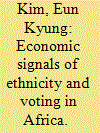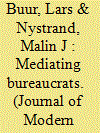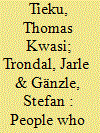|
|
|
Sort Order |
|
|
|
Items / Page
|
|
|
|
|
|
|
| Srl | Item |
| 1 |
ID:
176486


|
|
|
|
|
| Summary/Abstract |
The article argues that the impact of law enforcement efforts against corruption deserves more scholarly attention. Drawing on a mixed-methods study from Malawi in southern Africa, where a large-scale law enforcement operation has been investigating and prosecuting those involved in a 2013 corruption scandal known as ‘Cashgate’, the article explores the potential for corruption deterrence from the perspective of government officials in the Malawi civil service. Malawi provides a challenging environment for deterrence due to limited state capacity, weak law enforcement agencies and widespread corruption. Nonetheless, the research findings show that Malawian government officials perceive prosecutions and convictions to deter corruption, both with regards to the law enforcement response to Cashgate specifically and law enforcement efforts in general. The findings from Malawi suggest that law enforcement and criminal justice have the potential to make an important contribution to anti-corruption strategies in Africa and the Global South at large.
|
|
|
|
|
|
|
|
|
|
|
|
|
|
|
|
| 2 |
ID:
176488


|
|
|
|
|
| Summary/Abstract |
The existing literature has demonstrated that both ethnic and economic factors affect a vote decision in African democracies. I show that there is a meaningful interaction between the two cleavages in their influence on voting. In particular, I argue for political salience of agricultural subsectors that shape the electoral consequences of economic performance in the context where agricultural policy affects the livelihood of the majority population. Relying on the analyses of the 2007 and 2013 elections in Kenya, I illustrate how likely an individual, who is attached to a politically coherent ethnic group, votes for a candidate, the majority of whose ethnic members engage in the same industry as the voter himself regardless of the candidate's ethnicity. The results show that the sector factor reinforces the positive and negative effects of ethnic communities on incumbent support, and also explains voting by ethnic minorities whose motives for voting are not ethnic.
|
|
|
|
|
|
|
|
|
|
|
|
|
|
|
|
| 3 |
ID:
176491


|
|
|
|
|
| Summary/Abstract |
Does a leader's ethnicity affect the regional distribution of basic services such as education in Africa? Several influential studies have argued in the affirmative, by using educational attainment levels to show that children who share the ethnicity of the president during their school-aged years have higher attainment than their peers. In this paper we revisit this empirical evidence and show that it rests on problematic assumptions. Some models commonly used to test for favouritism do not take adequate account of educational convergence and once this is properly accounted for the results are found to be unstable. Using Kenya as a test case, we argue that there is no conclusive evidence of ethnic favouritism in primary or secondary education, but rather a process of educational convergence among the country's larger ethnic groups. This evidence matters, as it shapes how we understand the ethnic calculus of politicians.
|
|
|
|
|
|
|
|
|
|
|
|
|
|
|
|
| 4 |
ID:
176490


|
|
|
|
|
| Summary/Abstract |
With much fanfare, Ghana's Jubilee Oil Field was discovered in 2007 and began producing oil in 2010. In the six coastal districts nearest the offshore fields, expectations of oil-backed development have been raised. However, there is growing concern over what locals perceive to be negative impacts of oil and gas production. Based on field research conducted in 2010 and 2015 in the same communities in each district, this paper presents a longitudinal study of the impacts (real and perceived) of oil and gas production in Ghana. With few identifiable benefits beyond corporate social responsibility projects often disconnected from local development priorities, communities are growing angrier at their loss of livelihoods, increased social ills and dispossession from land and ocean. Assuming that others must be benefiting from the petroleum resources being extracted near their communities, there is growing frustration. High expectations, real and perceived grievances, and increasing social fragmentation threaten to lead to conflict and underdevelopment.
|
|
|
|
|
|
|
|
|
|
|
|
|
|
|
|
| 5 |
ID:
176487


|
|
|
|
|
| Summary/Abstract |
This article develops the concept of ‘mediating bureaucrats’ by exploring their role during liberal reforms that led to rehabilitation of the sugar industry in Mozambique. By focusing on how relations between the state, government and business are mediated by a group of cadres who have occupied positions in different social domains, the article argues that these ‘mediating bureaucrats’ cannot easily be identified in one-dimensional terms as belonging to either the public or private sector, the state or the market. It is argued that as ‘socially embedded actors’, the group of ‘mediating bureaucrats’ are in a position to translate and mediate between diverse and sometimes conflicting interests and aspirations of the state, the government and business. We use the rehabilitation of the sugar industry in Mozambique to show how mediating bureaucrats adopted two practices – muddling through and translation – in order to straddle conflicting interests during different reform initiatives in post-independence Mozambique.
|
|
|
|
|
|
|
|
|
|
|
|
|
|
|
|
| 6 |
ID:
176492


|
|
|
|
|
| Summary/Abstract |
This study contributes to the field of International Public Administration (IPA) and the emerging area of Informal International Relations (IIR) by examining the politics of staffing and recruitment of the African Union Commission (AUC). Although the AUC has become a major political player in international affairs, there is a dearth of knowledge about the civil servants who work for the AUC and who run this paramount pan-African executive body. To address the void, this paper draws on a survey of 137 AUC staff, archival studies and interviews to explore recruitment of AUC staff. Combining organisational theory and informality as analytical lenses, the study demonstrates that, first, many informal international practices (IIPs) are embedded in AUC recruitment processes. Second, the AUC is composed largely of short-term, contracted staff. Finally, it shows that the AUC is dependent on lower-ranked personnel or that it is bottom-heavy. Many of these lower-ranked officials are intimately involved in the making of AUC policies and decisions, putting into question the assumption in existing scholarship that decision-makers of IOs are primarily reliant on top-ranked A-level officials (senior management).
|
|
|
|
|
|
|
|
|
|
|
|
|
|
|
|
|
|
|
|
|